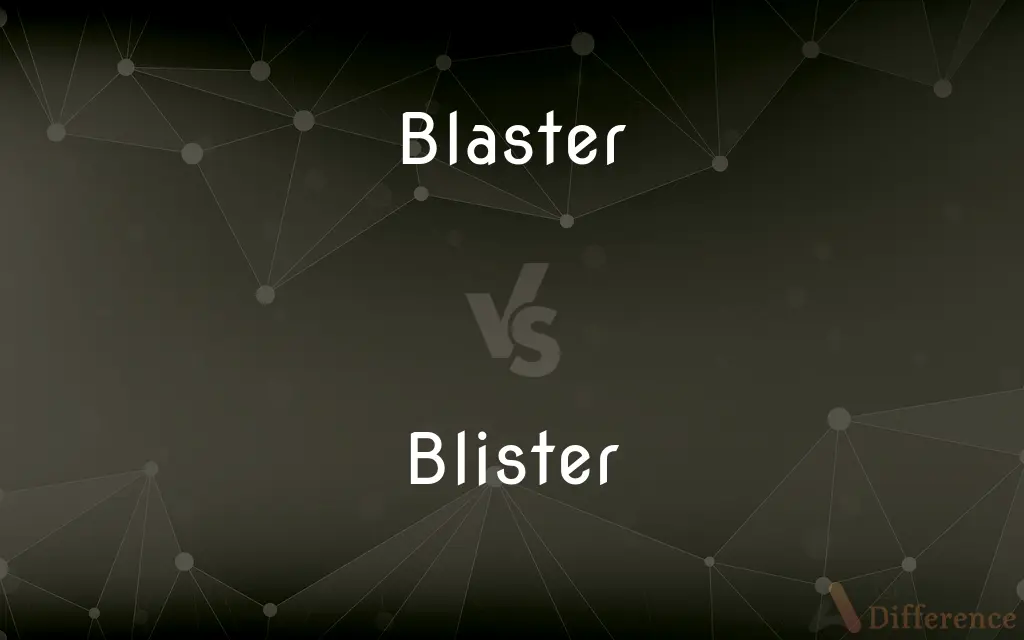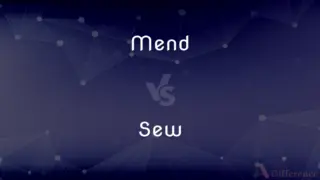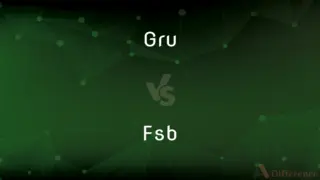Blaster vs. Blister — What's the Difference?
By Tayyaba Rehman & Urooj Arif — Updated on May 17, 2024
A blaster is a tool or device used to apply force, typically for breaking or propelling, while a blister is a small bubble on the skin filled with fluid caused by friction, burns, or other damage.

Difference Between Blaster and Blister
Table of Contents
ADVERTISEMENT
Key Differences
A blaster refers to a device or tool that emits force, often used in contexts like construction, mining, or fictional settings such as science fiction, where it might be a weapon that shoots energy. A blister, on the other hand, is a small bubble that forms on the skin, filled with clear fluid. Blisters are typically caused by friction (such as from shoes rubbing against the skin), burns, or other types of damage. They serve as a protective barrier to allow the underlying skin to heal.
While a blaster is an external tool or device with various industrial, practical, or fictional uses, a blister is a biological response to physical damage on the skin. Blasters involve applying force externally, whereas blisters form as a result of internal fluid accumulation due to skin irritation or injury.
Blasters are used intentionally for specific tasks requiring force or propulsion, while blisters are unintentional injuries that occur as a protective mechanism of the body.
Comparison Chart
Definition
Tool/device emitting force or energy
Skin bubble filled with fluid
Common Usage
Construction, mining, sci-fi weaponry
Caused by friction, burns, or damage
ADVERTISEMENT
Purpose
Breaking materials, propelling objects
Protecting damaged skin
Nature
External tool/device
Biological skin response
Intentionality
Used intentionally for specific tasks
Unintentional injury response
Compare with Definitions
Blaster
Often used in mining or demolition.
The blaster cleared the debris from the tunnel.
Blister
Acts as a protective barrier for healing.
The blister formed to protect the underlying skin.
Blaster
Can refer to fictional energy weapons in sci-fi.
The hero wielded a blaster to fend off the aliens.
Blister
Caused by friction, burns, or other skin damage.
The hot pan gave him a blister on his finger.
Blaster
May include tools that emit powerful streams of air or water.
A sandblaster is used to clean and etch surfaces.
Blister
A blister is a small pocket of body fluid (lymph, serum, plasma, blood, or pus) within the upper layers of the skin, usually caused by forceful rubbing (friction), burning, freezing, chemical exposure or infection. Most blisters are filled with a clear fluid, either serum or plasma.
Blaster
A very strong gust of wind or air.
Blister
A local swelling of the skin that contains watery fluid and is caused by burning or irritation.
Blaster
The effect of such a gust.
Blister
A similar swelling on a plant.
Blaster
A forcible stream of air, gas, or steam from an opening, especially one in a blast furnace to aid combustion.
Blister
A raised bubble, as on a painted or laminated surface.
Blaster
A sudden loud sound, especially one produced by a stream of forced air
A piercing blast from the steam whistle.
Blister
A rounded, bulging, usually transparent structure, such as one used for observation on certain aircraft or for display and protection of packaged products.
Blaster
The act of producing such a sound
Gave a blast on his trumpet.
Blister
To cause a blister to form on.
Blaster
A violent explosion, as of dynamite or a bomb.
Blister
To reprove harshly.
Blaster
The violent effect of such an explosion, consisting of a wave of increased atmospheric pressure followed immediately by a wave of decreased pressure.
Blister
To break out in or as if in blisters.
Blaster
An explosive charge.
Blister
A small bubble between the layers of the skin that contains watery or bloody fluid and is caused by friction and pressure, burning, freezing, chemical irritation, disease or infection.
Blaster
(Botany) Any of several plant diseases of diverse causes, resulting in sudden death of buds, flowers, foliage, or young fruits.
Blister
A swelling on a plant.
Blaster
A destructive or damaging influence.
Blister
(medicine) Something applied to the skin to raise a blister; a vesicatory or other applied medicine.
Blaster
A powerful hit, blow, or shot.
Blister
A bubble, as on a painted surface.
Blaster
A violent verbal assault or outburst
The candidate leveled a blast at her opponent.
Blister
(roofing) An enclosed pocket of air, which may be mixed with water or solvent vapor, trapped between impermeable layers of felt or between the membrane and substrate.
Blaster
(Slang) A highly exciting or pleasurable experience or event, such as a big party.
Blister
A type of pre-formed packaging made from plastic that contains cavities.
Blister card
Blister pack
Blaster
To knock down or shatter by explosion; smash.
Blister
A cause of annoyance.
Blaster
To play or sound loudly
The amplifiers blasted the music.
Blister
(uncountable) A form of smelted copper with a blistered surface.
Blaster
To cause to move with great force; hurl
The volcanic eruption blasted rock far and wide.
Blister
(transitive) To raise blisters on.
A chemical agent that blisters the skin
Blaster
To make or open by explosion
Blast a tunnel through the mountains.
Blister
To sear after blaching.
Blaster
To shoot or destroy by shooting
Fighter jets trying to blast each other out of the sky.
Blister
(intransitive) To have a blister form.
Blaster
(Sports) To hit, kick, or shoot (a ball or puck) with great force.
Blister
(transitive) To criticise severely.
Blaster
To have a harmful or destructive effect on
A loss that blasted our hopes of making the playoffs.
Blister
(intransitive) To break out in blisters.
Blaster
To criticize or attack vigorously
Blasted the mayor for hypocrisy.
Blister
A vesicle of the skin, containing watery matter or serum, whether occasioned by a burn or other injury, or by a vesicatory; a collection of serous fluid causing a bladderlike elevation of the cuticle.
And painful blisters swelled my tender hands.
Blaster
To cause to shrivel, wither, or mature imperfectly by blast or blight
Crops that were blasted by frost.
Blister
Any elevation made by the separation of the film or skin, as on plants; or by the swelling of the substance at the surface, as on steel.
Blaster
To use or detonate explosives.
Blister
A vesicatory; a plaster of Spanish flies, or other matter, applied to raise a blister.
Blaster
To emit a loud, intense sound; blare
Speakers blasting at full volume.
Blister
To be affected with a blister or blisters; to have a blister form on.
Let my tongue blister.
Blaster
To discharge a weapon, especially repeatedly; shoot
Blasted away at the target.
Blister
To raise a blister or blisters upon.
My hands were blistered.
Blaster
To attack someone or something verbally; criticize.
Blister
To give pain to, or to injure, as if by a blister.
This tyrant, whose sole name blisters our tongue.
Blaster
To move with great speed or power
A motorcycle blasting down the road.
Blister
(pathology) an elevation of the skin filled with serous fluid
Blaster
(Electronics) To distort sound recording or transmission by overloading a microphone or loudspeaker.
Blister
Get blistered;
Her feet blistered during the long hike
Blaster
To wither or shrivel or mature imperfectly.
Blister
Subject to harsh criticism;
The Senator blistered the administration in his speech on Friday
The professor scaled the students
Your invectives scorched the community
Blaster
Anything that, or anyone who blasts.
Infrared blaster
Blister
Cause blisters to from on;
The tight shoes and perspiration blistered her feet
Blaster
A device to detonate an explosive, often consisting of a box with a handle to be pressed down.
Blister
A small bubble on the skin filled with fluid.
She got a blister on her heel from her new shoes.
Blaster
(science fiction) An unspecified powerful hand weapon, usually one that fires an energy pulse or beam.
Blister
Can be painful and prone to infection if not cared for.
It's important to keep the blister clean and covered.
Blaster
A sand wedge.
Blister
Typically filled with clear fluid.
The blister eventually burst, releasing the fluid inside.
Blaster
One who, or that which, blasts or destroys.
Blaster
A workman employed to blast with explosives
Blaster
A device that emits force or energy.
The construction crew used a blaster to break apart the rock.
Blaster
Designed to apply significant force.
The blaster's force was enough to dislodge the stubborn material.
Common Curiosities
What is a blaster?
A blaster is a device or tool that emits force or energy, used in contexts like construction or science fiction.
What is a blister?
A blister is a small, fluid-filled bubble that forms on the skin due to friction, burns, or other damage.
Can a blaster be a weapon?
Yes, in science fiction, a blaster often refers to a weapon that shoots energy or particles.
How is a blaster used in construction?
In construction, blasters are used to break apart rocks or debris, often through explosive or pneumatic force.
How does a blister form?
Blisters form when the skin is damaged by friction, heat, or other irritants, causing fluid to accumulate under the surface.
What are some types of blasters?
Types of blasters include sandblasters, water blasters, and explosive blasters used in mining and construction.
How should a blister be treated?
Blisters should be kept clean, covered, and allowed to heal naturally; avoid puncturing them to prevent infection.
Is a blaster always destructive?
Not always; while many blasters are used for breaking or dislodging materials, some are used for non-destructive purposes like cleaning.
Can blasters be used for cleaning?
Yes, sandblasters and water blasters are used for cleaning and surface preparation in various industries.
Can blisters form from heat?
Yes, burns from heat can cause blisters to form as the skin's response to damage.
Do blisters always need medical attention?
Not always; most blisters heal on their own, but medical attention may be needed if they become infected or very painful.
Are blisters harmful?
Blisters can be painful and, if not properly cared for, may become infected, but they generally serve as a protective mechanism.
What safety measures are used with blasters?
Safety measures include wearing protective gear, ensuring proper training, and following protocols to prevent accidents during use.
Are blasters used in entertainment or media?
Yes, blasters are commonly depicted as futuristic weapons in movies, TV shows, and video games.
What causes friction blisters?
Friction blisters are caused by repeated rubbing of the skin, often from shoes or manual labor.
Share Your Discovery

Previous Comparison
Mend vs. Sew
Next Comparison
Gru vs. FsbAuthor Spotlight
Written by
Tayyaba RehmanTayyaba Rehman is a distinguished writer, currently serving as a primary contributor to askdifference.com. As a researcher in semantics and etymology, Tayyaba's passion for the complexity of languages and their distinctions has found a perfect home on the platform. Tayyaba delves into the intricacies of language, distinguishing between commonly confused words and phrases, thereby providing clarity for readers worldwide.
Co-written by
Urooj ArifUrooj is a skilled content writer at Ask Difference, known for her exceptional ability to simplify complex topics into engaging and informative content. With a passion for research and a flair for clear, concise writing, she consistently delivers articles that resonate with our diverse audience.
















































